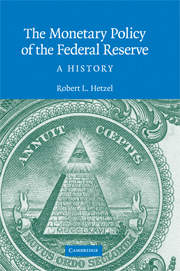Book contents
- Frontmatter
- Contents
- Figures
- Preface
- 1 The Pragmatic Evolution of the Monetary Standard
- 2 Learning and Policy Ambiguity
- 3 From Gold to Fiat Money
- 4 From World War II to the Accord
- 5 Martin and Lean-against-the-Wind
- 6 Inflation Is a Nonmonetary Phenomenon
- 7 The Start of the Great Inflation
- 8 Arthur Burns and Richard Nixon
- 9 Bretton Woods
- 10 Policy in the Ford Administration
- 11 Carter, Burns, and Miller
- 12 The Political Economy of Inflation
- 13 The Volcker Disinflation
- 14 Monetary Policy after the Disinflation
- 15 Greenspan's Move to Price Stability
- 16 International Bailouts and Moral Hazard
- 17 Monetary Policy Becomes Expansionary
- 18 Departing from the Standard Procedures
- 19 Boom and Bust: 1997 to 2001
- 20 Backing Off from Price Stability
- 21 The Volcker–Greenspan Regime
- 22 The Fed: Inflation Fighter or Inflation Creator?
- 23 The Stop–Go Laboratory
- 24 Stop–Go and Interest Rate Inertia
- 25 Monetary Nonneutrality in the Stop–Go Era
- 26 A Century of Monetary Experiments
- Appendix: Data Seen by FOMC for the Stop–Go Period Shown in Figures 24.1, 24.2, and 24.3
- Notes
- Bibliography
- Index
- Titles in the series
14 - Monetary Policy after the Disinflation
Published online by Cambridge University Press: 26 May 2010
- Frontmatter
- Contents
- Figures
- Preface
- 1 The Pragmatic Evolution of the Monetary Standard
- 2 Learning and Policy Ambiguity
- 3 From Gold to Fiat Money
- 4 From World War II to the Accord
- 5 Martin and Lean-against-the-Wind
- 6 Inflation Is a Nonmonetary Phenomenon
- 7 The Start of the Great Inflation
- 8 Arthur Burns and Richard Nixon
- 9 Bretton Woods
- 10 Policy in the Ford Administration
- 11 Carter, Burns, and Miller
- 12 The Political Economy of Inflation
- 13 The Volcker Disinflation
- 14 Monetary Policy after the Disinflation
- 15 Greenspan's Move to Price Stability
- 16 International Bailouts and Moral Hazard
- 17 Monetary Policy Becomes Expansionary
- 18 Departing from the Standard Procedures
- 19 Boom and Bust: 1997 to 2001
- 20 Backing Off from Price Stability
- 21 The Volcker–Greenspan Regime
- 22 The Fed: Inflation Fighter or Inflation Creator?
- 23 The Stop–Go Laboratory
- 24 Stop–Go and Interest Rate Inertia
- 25 Monetary Nonneutrality in the Stop–Go Era
- 26 A Century of Monetary Experiments
- Appendix: Data Seen by FOMC for the Stop–Go Period Shown in Figures 24.1, 24.2, and 24.3
- Notes
- Bibliography
- Index
- Titles in the series
Summary
Volcker was a crisis manager whose immediate goal was to prevent a surge in inflation from permanently raising inflationary expectations. On October 9, 1979, Volcker (cited in Lindsey, Orphanides, and Rasche, 2005, 205) told the American Bankers Association that “the immediate challenge is to avoid imbedding the current rate of inflation in expectations and wage and pricing decisions, before the current bulge in prices subsides.” However, the road to restoring credibility for low inflation was long and difficult. The bond markets provided the most sensitive measure of inflationary expectations, and bond rates rose during economic recovery when real growth rose above trend.
At his first FOMC meeting as chairman, Volcker (Board of Governors Transcripts August 14, 1979, 21, cited in Goodfriend and King 2005, 27) explained the consequences of the loss of credibility: “I am impressed myself by an intangible: the degree to which inflationary psychology has really changed. … That's important to us because it does produce … paradoxical reactions to policy. … [T]he ordinary response one expects to easing actions … won't work if they're interpreted as inflationary; and much of the stimulus will come out in prices rather than activity.” Sensitivity to market expectations pushed the FOMC to raise the funds rate when the growth gap became positive not when a negative output gap approached zero. Bond market vigilantes pushed the FOMC to create a new monetary standard based on stable expected inflation as the nominal anchor.
Money targets had advertised the FOMC's commitment to lower inflation.
- Type
- Chapter
- Information
- The Monetary Policy of the Federal ReserveA History, pp. 172 - 195Publisher: Cambridge University PressPrint publication year: 2008

